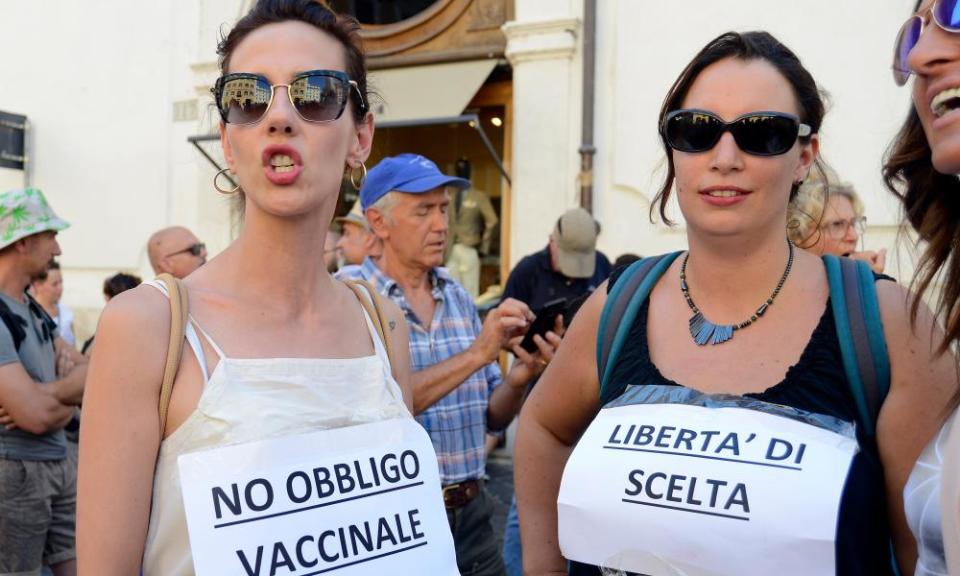Rise of Italian populist parties buoys anti-vaccine movement
Backlash against sportsman’s post about his young daughter highlights lingering distrust

When Ivan Zaytsev, a volleyball player with Italy’s national team and an Olympic medallist, posted a picture of himself alongside his child on social media last week, it wasn’t intended to be a political statement.
His seven-month-old daughter had just received a vaccine and Zaytsev wanted to celebrate her bravery. But within seconds he was hit with a deluge of abuse from anti-vaccine activists. The attacks ranged from accusations of being bankrolled by pharmaceutical companies to chilling messages wishing for his child to contract a disease.
“I wanted to share this moment as a parent and congratulate my daughter – she smiled during the entire process – as well as reassure other parents,” Zaytsev, who also has a son, told the Guardian. “I realise that I’m a public figure and everything I do has consequences, but I didn’t expect this. When it touches me it’s one thing, but when they wish illness for your children then you become very angry.”
He did not officially report the case but Italian postal police, who investigate online crime, are trying to trace the perpetrators. Last year they shut down a Facebook page that organised “measles parties” so that parents could expose their children to the disease in an attempt to immunise them naturally.
The small but virulent anti-vaccine movement has been buoyed by the rise to power of a populist coalition sceptical about injections. Days after Zaytsev posted his photo, Giulia Grillo, Italy’s health minister, said parents no longer had to provide schools with a doctor’s certificate proving their children had been vaccinated.
A post shared by Ivan Zaytsev (@zaytsev_official) on Jul 3, 2018 at 3:40am PDT
A law introduced by Grillo’s predecessor, Beatrice Lorenzin, last July made 10 vaccines mandatory for children enrolling in state-run schools. As the new government debates a revision of the law, Grillo said the decision to drop the certificate requirement was aimed at spurring school inclusion and simplifying rules for parents.
The law was brought in to boost immunisation coverage amid a surge in the number of measles cases in the country. Last year Italy recorded 4,885 instances of the highly contagious disease, second in Europe behind Romania. So far this year there have been 1,700 cases and four deaths.
A five-fold increase in measles cases in the UK recently prompted British doctors to advise precaution when travelling in countries with a low immunisation coverage such as Italy.
“Unfortunately it’s a fact that Italy has a coverage of measles that is similar to Namibia,” said Roberto Burioni, a professor of microbiology and virology at Vita-Salute San Raffaele University in Milan. “So objectively, those who come to our country are at risk of contracting measles.”
Grillo is a member of the Five Star Movement (M5S), whose founder, Beppe Grillo (no relation), has said in the past that vaccines can be as dangerous as the diseases they protect against. In 2015 the party proposed a law against vaccinations, citing “the link between vaccinations and specific illnesses such as leukaemia, poisoning, inflammation, immunodepression, inheritable genetic mutations, cancer, autism and allergies.”
Before the election in March, M5S changed course slightly. The party leader, Luigi Di Maio, said he was not anti-vaccination but against obliging parents to have their children injected. Last week Giulia Grillo, who is pregnant with her first child, said she would have her baby vaccinated.
But M5S’s coalition ally, the League, could end up dictating how the debate is resolved. Matteo Salvini, the party’s leader and deputy prime minister, recently said the requirement for 10 vaccines was “too much”.
“It’s difficult to know what [the government] will do because within M5S there are different positions – some are close to the scientific position, others are opposed,” said Burioni. “The League doesn’t leave me feeling very optimistic but judging before they’ve done anything would be premature.”
Italians’ perception of the safety of vaccinations was heavily influenced by now discredited claims of a connection between the combined measles, mumps and rubella (MMR) vaccination and autism.
In a high-profile case in 2012, a court in Rimini awarded compensation to the family of an autistic child after ruling that the child’s autism had probably been caused by the MMR jab. The judgment was quashed on appeal three years later.
The low coverage also stems from mistrust of mainstream politicians and experts. “There is a crisis of trust in all the elites,” said Giovanni Orsina, a politics professor at Luiss University in Rome. “So if a doctor says ‘you must vaccinate your child’, he’s not seen as someone competent but as someone who gets money from companies that sell vaccines.”
Orsina said that while the issue of obligation would be a central part of the political debate, he did not believe the government would veer too far in the direction of anti-vaccine campaigners. “They will do something but not too much,” he said.

